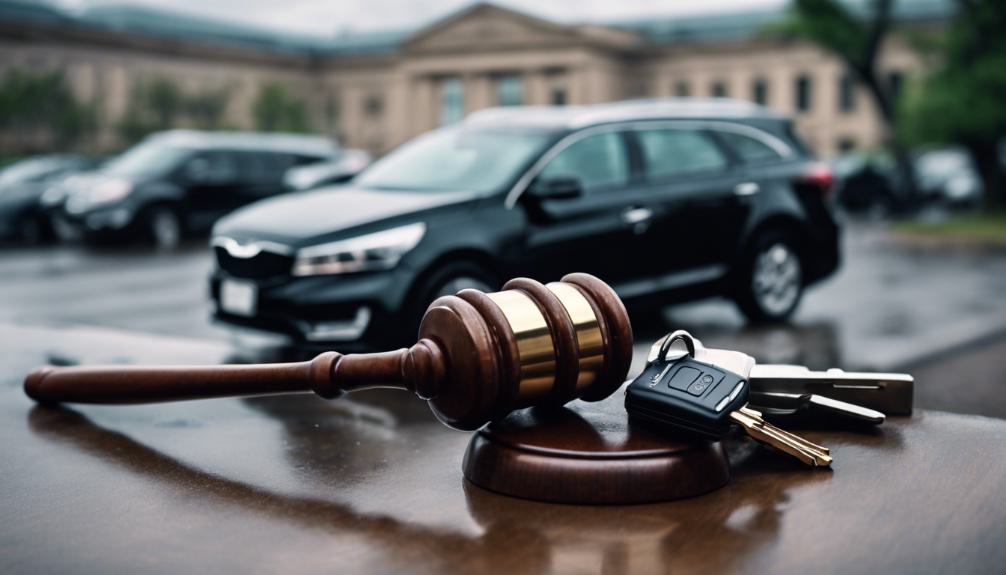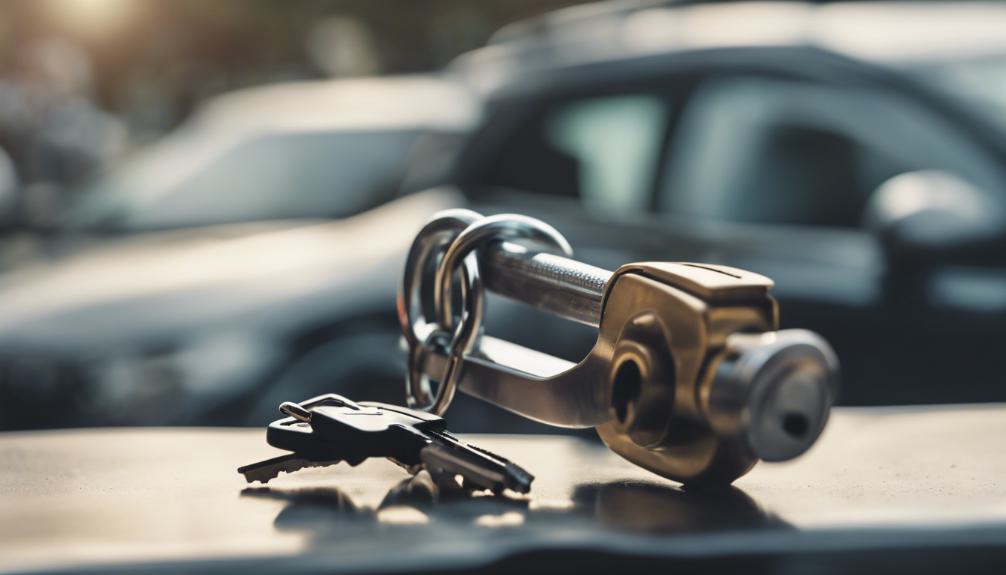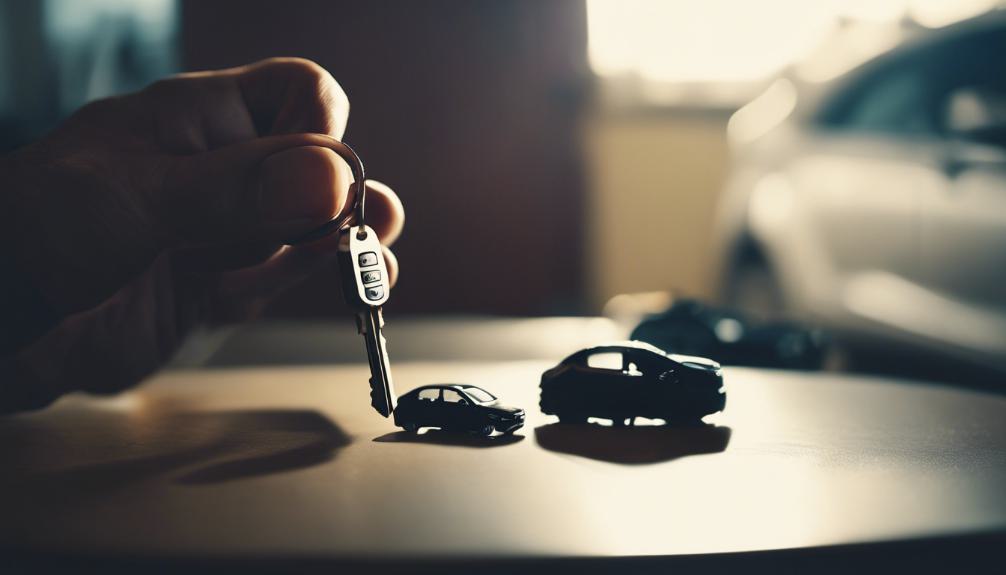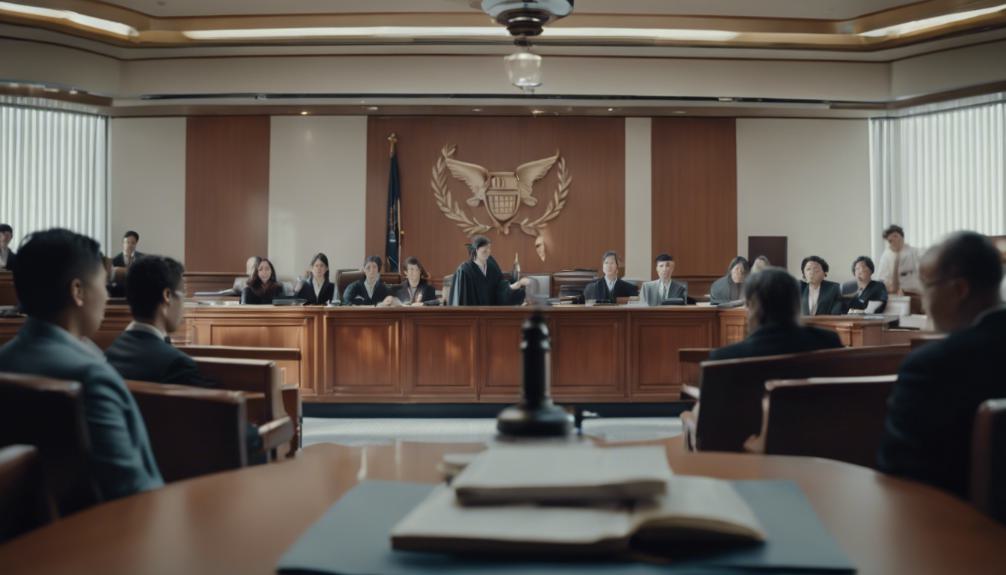Kia, Hyundai Face Theft Crisis Lawsuits
The recent lawsuits facing Kia and Hyundai over a spike in vehicle thefts signify a complex challenge at the intersection of automotive security and legal accountability. These incidents, stemming from identified vulnerabilities in the manufacturers' security systems, have escalated into a legal battleground that questions the adequacy of their response to protect consumers. As these class action suits progress, they not only seek compensation for affected vehicle owners but also aim to prompt a broader discussion on the responsibilities of auto manufacturers in ensuring vehicle safety. This unfolding scenario invites a closer examination of the implications for consumer trust, regulatory standards, and the future of automotive security.
Key Takeaways
- Kia and Hyundai acknowledge security flaws, triggering class action lawsuits for compensation.
- Legal actions highlight the need for improved anti-theft features in vehicles.
- Manufacturers promise investigations and enhancements to prevent future thefts.
- Consumer advocacy and education efforts intensify amidst rising vehicle theft incidents.
Vehicle Theft Overview

How have Kia and Hyundai vehicles become a target for widespread theft, exposing a critical vulnerability in their security measures? The core of this issue lies in the absence of essential anti-theft features in these vehicles, which has inadvertently made them susceptible to theft. Across various regions, there has been a significant increase in reports of stolen Kia and Hyundai cars, underscoring a glaring security lapse. This situation has not only impacted vehicle owners, through loss and inconvenience, but also placed a considerable burden on insurance companies facing a surge in claims. Additionally, the wave of thefts has prompted legal actions from affected parties, who seek accountability and redress for their losses. This escalating problem serves as a stark reminder of the importance of robust security measures in protecting property and serving community interests.
Manufacturer Responses

In response to the escalating theft crisis, Kia and Hyundai have issued statements acknowledging the issue and outlining their plans to investigate the security vulnerabilities of their vehicles. The manufacturers expressed their commitment to enhancing the security features of their vehicles to prevent future thefts. They have initiated thorough investigations into the reported vulnerabilities and are working closely with law enforcement agencies to address the situation effectively. Both companies have also promised to keep the public informed about their progress and any measures being taken to resolve the crisis. They underscored their dedication to serving the needs of their customers and ensuring their peace of mind by taking swift action to mitigate the risks associated with vehicle theft.
Legal Actions Unfold

Amid the rising tide of vehicle thefts, class action lawsuits have been filed against Kia and Hyundai, marking a significant escalation in the legal battle over the companies' alleged security failures. These legal actions underscore the gravity of the situation and the pressing need for accountability and remedy. For those affected, these lawsuits represent a beacon of hope, offering a pathway to seek redress and compensation for the losses and hardships endured. The legal proceedings also serve a broader purpose, highlighting the importance of robust vehicle security measures and the responsibility of manufacturers to make sure the safety of their products. As these cases unfold, they not only seek justice for the victims but also aim to drive meaningful change in the automotive industry, emphasizing the paramount importance of consumer safety and trust.
Class Action Details

Several class action lawsuits have been initiated against Kia and Hyundai, stemming from allegations of inadequate vehicle security measures which have led to widespread thefts. These legal actions represent a collective effort by affected vehicle owners to seek justice and compensation for the losses incurred due to what they perceive as negligence on the part of the automobile manufacturers. The plaintiffs argue that the companies failed to implement necessary security features, thereby exposing their vehicles to a higher risk of theft. As these class actions progress, they underscore the importance of corporate responsibility in ensuring product safety. The legal representatives for the affected owners are pushing for a resolution that not only addresses the financial damages but also compels Kia and Hyundai to fortify their vehicles against future thefts, thereby safeguarding the community at large.
Raising Consumer Awareness

To mitigate the ongoing theft crisis, efforts to enhance consumer awareness about the vulnerabilities of Kia and Hyundai vehicles have intensified. Advocacy groups, together with affected vehicle owners, are spearheading initiatives to inform the public about the potential risks associated with these vehicles. Through social media campaigns, community workshops, and collaboration with local law enforcement, they aim to educate car owners on preventive measures to secure their vehicles better. This proactive approach not only empowers individuals with the knowledge to protect their property but also fosters a sense of community solidarity against common threats. By highlighting the significance of reporting theft incidents, these efforts contribute to a broader understanding of the issue, facilitating more informed decisions and actions by current and prospective vehicle owners.
Future Industry Impact

While raising consumer awareness is a pivotal step in addressing the immediate concerns, the theft crisis involving Kia and Hyundai vehicles also portends significant long-term impacts on the automotive industry. The heightened scrutiny on vehicle security measures could accelerate the adoption of advanced security technologies across the board, potentially setting new industry standards. Manufacturers may face increased regulatory pressures to guarantee that vehicles are equipped with robust anti-theft systems, thereby elevating safety protocols. This situation underscores the importance of proactive measures and collaboration among manufacturers, consumers, and regulatory bodies to enhance vehicle security. Ultimately, it emphasizes the collective responsibility in fostering an environment where consumer trust is prioritized, and the integrity of automotive security is upheld to prevent similar crises in the future.
Lessons for All Stakeholders

The theft crisis involving Kia and Hyundai vehicles offers important lessons for manufacturers, consumers, and regulatory bodies on the importance of vehicle security. Manufacturers are reminded of their responsibility to incorporate robust security features from the design phase, ensuring their vehicles are less susceptible to theft. This situation underscores the necessity for ongoing vigilance and adaptation to emerging security threats. Consumers, on the other hand, are encouraged to stay informed about the security aspects of their vehicles and to take proactive steps to protect their investments. Regulatory bodies must also intensify their oversight, pushing for higher security standards and swift responses to vulnerabilities. Ultimately, this crisis highlights the interconnected roles of all stakeholders in fostering a safer automotive environment, emphasizing the collective effort required to mitigate such risks effectively.
Frequently Asked Questions
How Can Owners of Kia and Hyundai Vehicles Check if Their Specific Model Is Affected by the Theft Vulnerability?
Owners of Kia and Hyundai vehicles concerned about potential theft vulnerabilities can verify if their model is affected by visiting the official websites of Kia and Hyundai. These platforms provide detailed information on affected models and the steps for verification. Additionally, vehicle identification number (VIN) checks are available, offering personalized information regarding recall notices or security updates. For further assistance, contacting customer service or authorized dealerships is recommended to guarantee vehicles are adequately protected.
What Specific Steps Should Kia and Hyundai Vehicle Owners Take Immediately if Their Vehicle Is Stolen?
In the unfortunate event of vehicle theft, immediate action is paramount. Owners should first report the theft to local law enforcement, providing all relevant details to facilitate the recovery process. Subsequently, contacting their insurance company is essential to initiate a claim and discuss potential coverage for the loss. Additionally, if applicable, owners are advised to inform a tracking service provider to activate the vehicle's tracking system, enhancing the chances of retrieval.
Are There Any Third-Party Security Devices or Systems Recommended by Kia and Hyundai to Enhance Vehicle Protection Against Theft?
In response to concerns about vehicle theft, Kia and Hyundai have suggested that owners consider implementing additional security measures. While they have not specifically endorsed any third-party security devices or systems, they recommend exploring options such as steering locks, alarm systems, and vehicle tracking devices. These measures can provide an extra layer of protection and deterrence against theft, complementing the existing security features of the vehicles. Owners are encouraged to assess their security needs and select appropriate devices.
How Can Consumers Participate in or Support the Class Action Lawsuits if They Have Been Affected by the Theft Issue but Have Not yet Joined Any Legal Action?
Affected consumers wishing to support or join the class action lawsuits can start by consulting legal professionals specializing in consumer rights. An illustrative case involves a group of vehicle owners banding together to seek justice, demonstrating the power of collective action. It is advisable to document all relevant incidents and communications. Additionally, engaging with consumer advocacy groups and participating in awareness campaigns can amplify their voices, ensuring a broader impact on future security measures and consumer protection.
What Are the Specific Criteria or Conditions Under Which Insurance Companies Might Refuse to Cover Theft-Related Claims for Kia and Hyundai Vehicles Known to Have Security Vulnerabilities?
Insurance companies may deny theft-related claims for vehicles with known security vulnerabilities under certain conditions. These can include instances where the owner failed to take reasonable steps to secure the vehicle despite widespread awareness of the vulnerability. Additionally, if insurance policies have specific clauses excluding coverage for thefts facilitated by such known security flaws, claims may also be refused. Policyholders are advised to review their insurance agreements and understand the terms regarding theft coverage.
Conclusion
To summarize, the surge in vehicle thefts impacting Kia and Hyundai highlights a critical vulnerability in automotive security that demands immediate collective action. Through manufacturer responses, legal proceedings, and heightened consumer awareness, this crisis serves as a pivotal moment for the automotive industry. It underscores the importance of robust security measures, the necessity for ongoing vigilance, and the potential for regulatory evolution. This situation exemplifies a broader lesson for stakeholders across industries: the imperative of prioritizing consumer safety in the face of technological advancements.

This post has been generated by AI and was not reviewed by editors. This is Not legal advice. Please consult with an attorney.